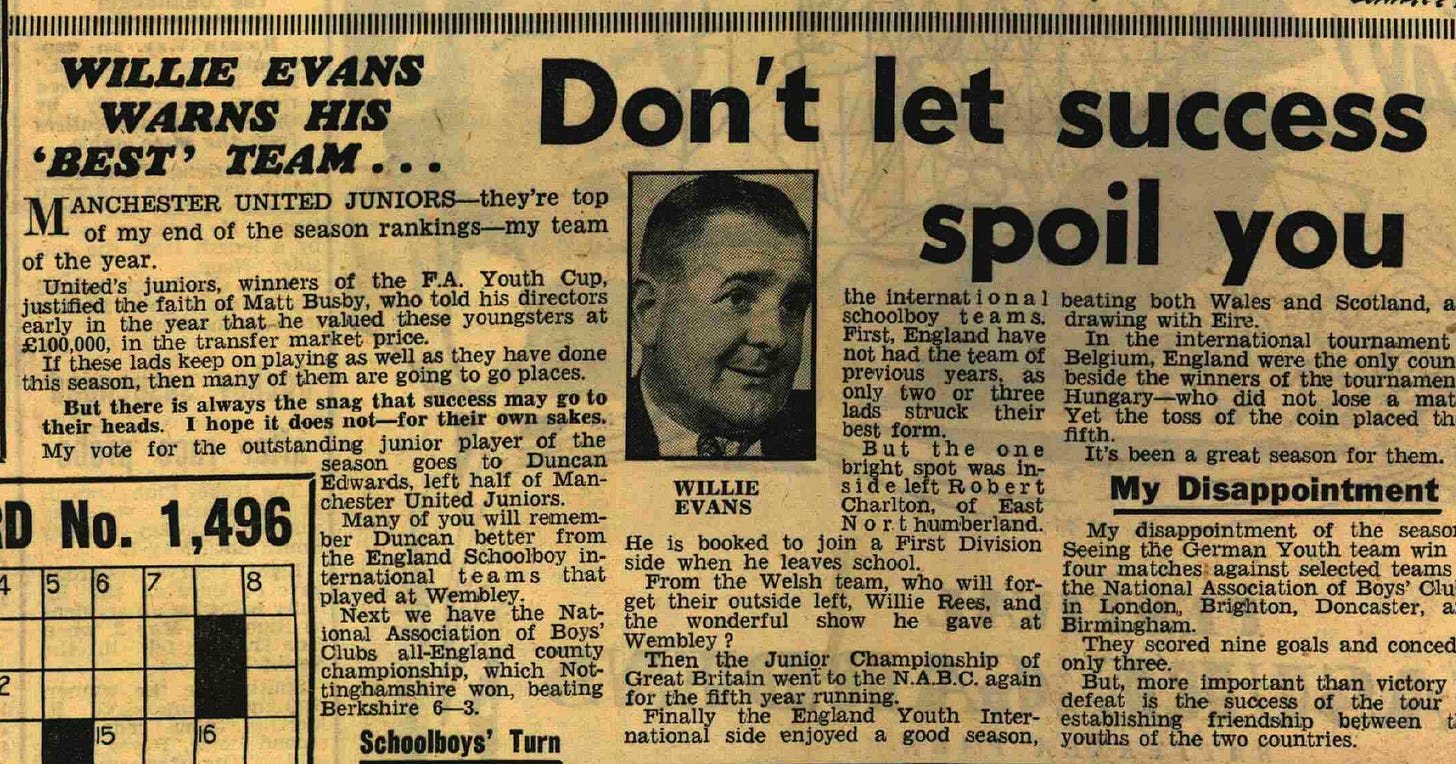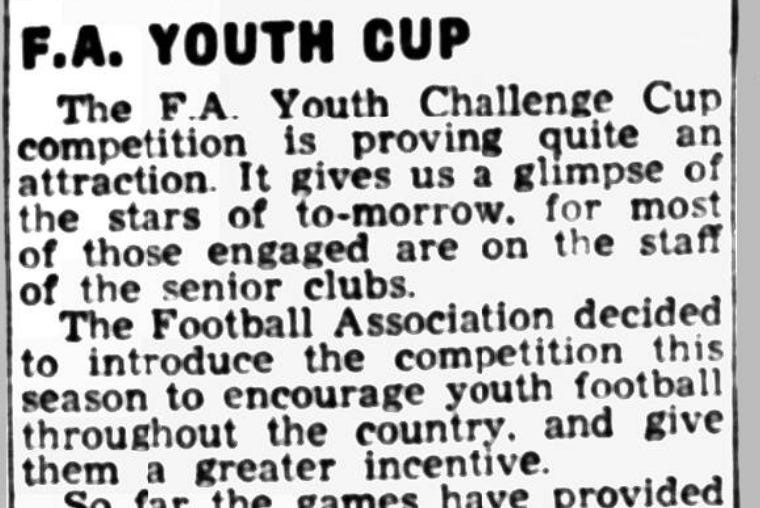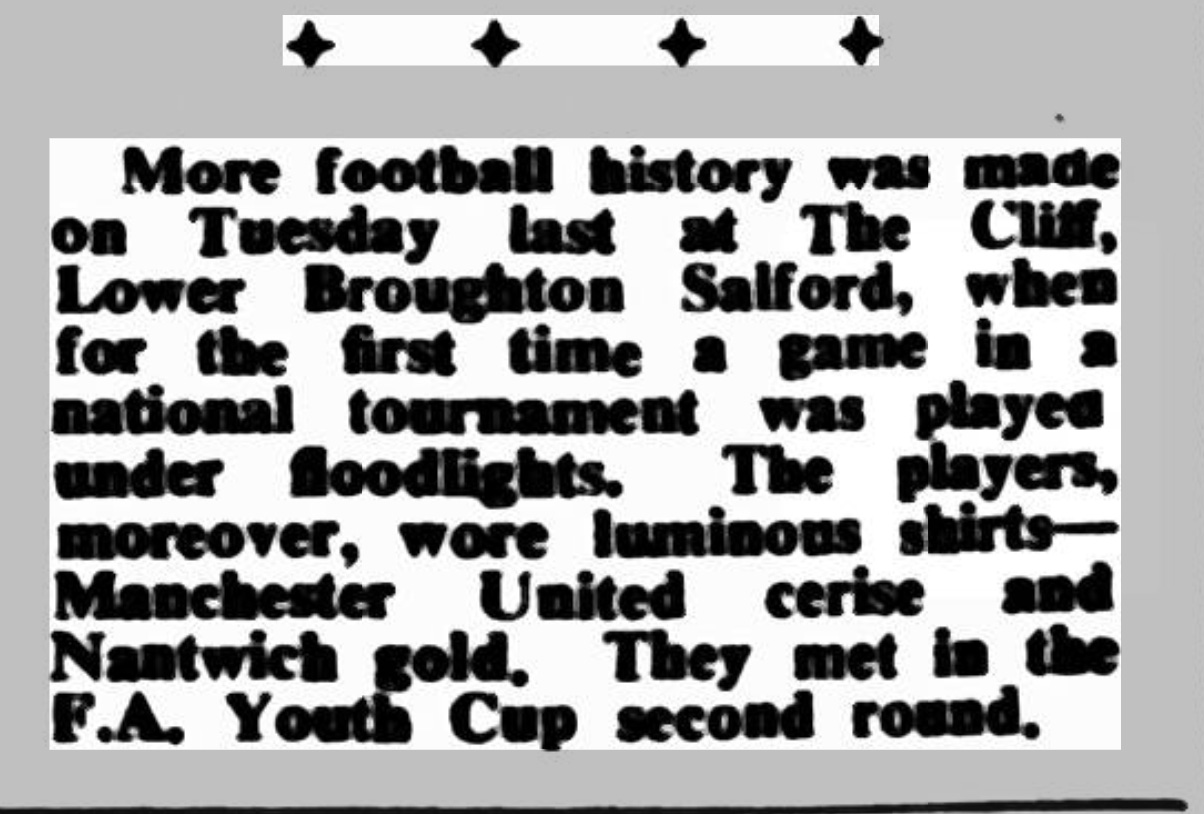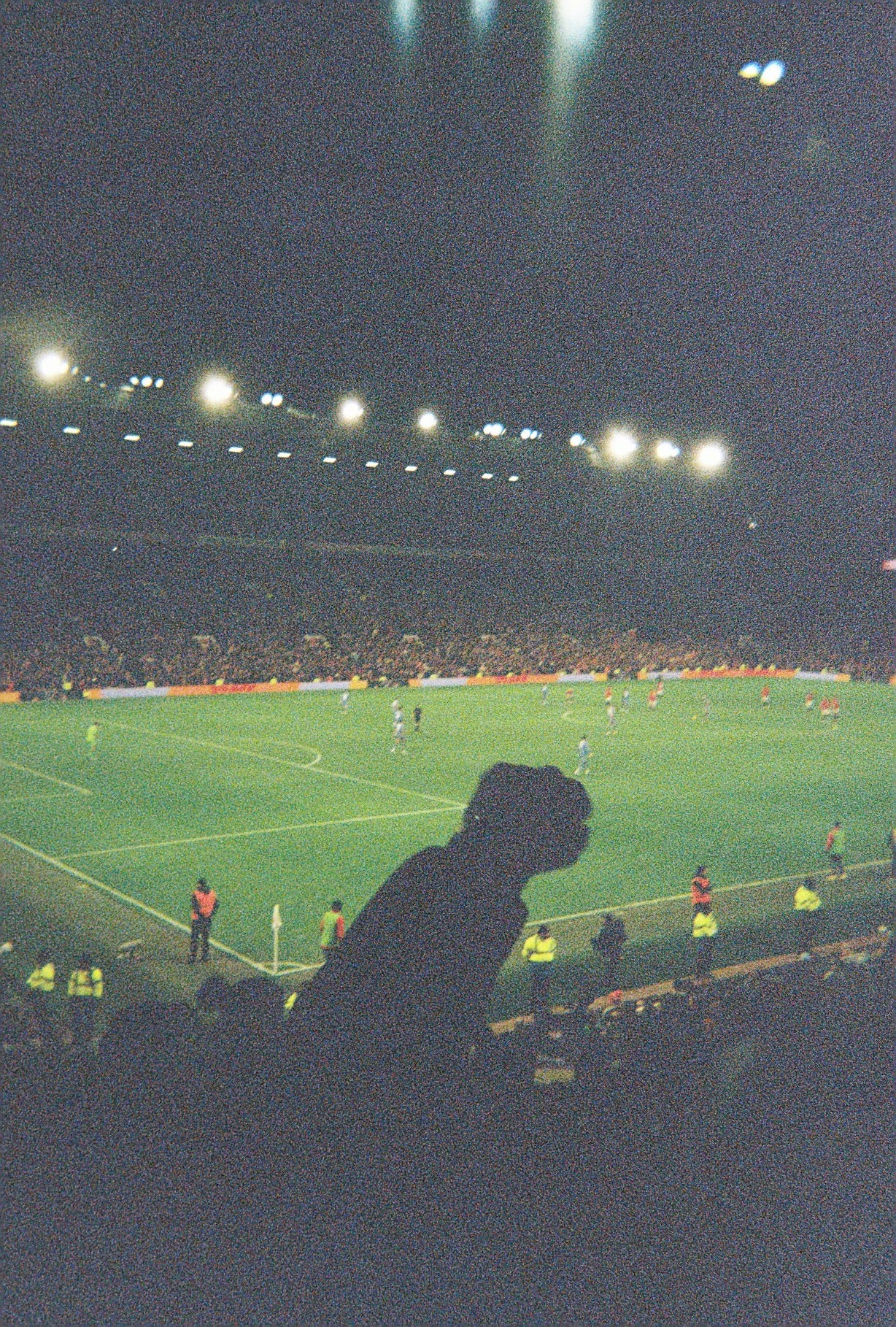Analysis & context: United U18s beaten in FA Youth Cup
Why did United lose at Swindon, how will coaches respond? Plus: fun Youth Cup history, Boxing Day (h) on film, MUFC trivia and more
If you’re new here: I’m Harry Robinson, a 23-year-old Stretford Ender, freelance football journalist and the author of The Men Who Made Manchester United. I write about things I’m passionate about, mainly MUFC, history, youth football and travel.
What’s inside:
FA Youth Cup
Youth Cup history tidbits
MUFC trivia
On film: comeback celebrations
Trivia answer
1: United knocked out of the FA Youth Cup
Two first-half goals from Botan Ameen helped a deserving Swindon Town side knock 11-time winners Manchester United out of the FA Youth Cup in a Tuesday evening game at the County Ground.
It’s a shock result and United’s disappointment will match Swindon’s elation. This Under-18s squad approached the game with a 100% record in the U18 Premier League, winning all of their 11 games so far this season, scoring 37 and conceding only seven goals. That excellent run has persisted even with a remarkable total of 30 players being used across the season. Most line-ups have included five or six changes from the previous week. That’s a deliberate tactic to ensure every player is getting good exposure to a variety of games, but it’s certainly one that would affect most teams’ results. Not this one, however, until now.
Defeat in the Youth Cup wasn’t due to team changes, though. Swindon played well and took full advantage of some defensive mistakes. Ameen’s first was a tap-in after an overload at the far left post, his second a rasping drive into the roof of the net after he turned past Jack Kingdon well.
I’ve spoken to Nick Cox, United’s Director of Academy, regularly throughout the season and the message is consistent, just as it was two years ago when I followed Garnacho, Mainoo and Gore’s victorious squad. Development trumps results in terms of the Academy’s priorities. However, that mantra means different things in different competitions and United certainly place great emphasis on the FA Youth Cup and UEFA Youth League.
The line-ups in both competitions speak volumes as to who the coaches value most highly in the Academy. Games in these tournaments are crucial to development and offer a more intense learning environment than the league does. The coaches want the highest-potential players to be exposed to that. Furthermore, results are a good marker of a team. It’s little surprise that five of the 2022 Youth Cup-winning squad have since made first-team debuts. So, a second consecutive season ending in a fourth-round Youth Cup exit will be a major disappointment.
It felt like the magnitude of the occasion may have affected some of the team’s performances. The passing was a little off, some things were rushed, and a few leaned back while they were shooting. It was a similar story in Round Three. The two full-backs showed some really positive signs, though. Left-back Harry Amass, who joined from Watford last summer, is showing regular quality and stood out in the third-round win as well as here. He looks for a pass forward constantly and is often thinking ahead of his attacking teammates. Right-back Habeeb Ogunneye played with excellent intensity, regularly stepping up to win possession.
There are lessons to be learned elsewhere. How do you break down a team sitting back for 45 minutes? How do you keep composure when conceding a surprise early goal? How do you play with urgency and patience at the same time? It’s key things you need to be a United player, and there’ll be lots taken from this game for these young lads, who do have real talent.
There’ll be no panic from the coaches’ perspective. “We learnt just as much losing to Stoke in round four last year as we did winning it the year before,” one staff member said recently. Development over the results, that’s the mantra, but this is a tough one to take.
Opportunities to make amends are coming up soon, though. The U18s play Manchester City in the league on Saturday morning (11am, live on MUTV) and have one cup competition still to win. They play Arsenal in the U18 Premier League Cup quarter-final on 3 February.
2: FA Youth Cup history tidbits
I love the FA Youth Cup.
Having worked closely with the Academy and as a fan, it’s gutting to see United knocked out but it’s a life-changing night for the Swindon team. Especially at a club like theirs - though it can be true at United, too - there will be players who won’t make it in the professional game but whatever comes next they now they have the memory of a lifetime… they’ve beaten the famous Man United. That’s the magic of the Youth Cup.
So, how about some fun Youth Cup history…
The tournament has barely changed since its 1952 inception. It had been mooted for some years prior to this, regularly mentioned by Angus Seed of Barnsley before it was picked up on a national scale. The first newspaper mention I can find comes on 10 January 1952 when the Yorkshire Evening Post spoke of “National Youth Cup plans” with 50 clubs “stated to be interested to some degree.”
Within months, a firm structure was in place. The trophy was sourced by Football League secretary Fred Howart who found an old wartime trophy and gave it over to the FA.
The competition was apparently first proposed within the League structure but dismissed. The FA liked it more. They had a pre-existing Youth Championship but this was based on County Associations because youth football didn’t exist at most clubs until post-war economics necessitated it. United’s own Academy began partially in 1932 and properly from 1938.
The Youth Cup, to be competed by professional clubs, seems a no-brainer looking back. It sought to provide a sense of jeopardy alongside a bit of magic and prestige. What’s changed in 70 years? Very little.
It still provides bigger crowds, media focus, knockout football conditions and grandeur. It’s the perfect preparation for the senior game.
United, of course, dominated the early Youth Cup, which attracted the nation’s attention pretty quickly.
“The F.A. Youth Challenge Cup is proving quite an attraction,” said the Liverpool Echo on 11 November 1952. “It gives us a glimpse of the stars of to-morrow, for most of those engaged are on the staff of the senior clubs.”
Again, little has changed!
By this time, United had played their first game already. Jimmy Murphy’s young side set a Youth Cup record immediately by thrashing Nantwich 23-0. That wasn’t the only history made, either. It was the first time a game in a national tournament was played under floodlights.
Matt Busby was keen to use The Cliff’s new floodlights and arranged with Nantwich to swap who would act as host. United paid them £50 to do so and gave them luminous gold shirts to wear. United’s were ‘luminous cerise’. Duncan Edwards, David Pegg and John Doherty scored five each. Busby and United signed Nantwich goalkeeper Ben Thorley immediately after the game, believing he’d done well to keep the 23-0 scoreline down.
Within weeks, 17-year-old Eddie Lewis made his first-team debut, showing quickly the impact a good Youth Cup performance could have. He scored on his debut in a 3-1 defeat at West Brom.
So, there’s some Youth Cup history for you! If you want more interesting MUFC history, you might like my book, The Men Who Made Manchester United. You can order it here.
If you’ve read the book and enjoyed it, I’d really appreciate it if you were kind enough to leave a review on Amazon. It helps more people find it as well as making me feel good! And it might help me write another book. You never know, it could be on the Youth Cup…
3: MUFC trivia
Which of these Busby Babes captained United to Youth Cup glory?
a) Duncan Edwards b) Bobby Charlton c) Eddie Colman
4: On film: Comeback celebrations
Taken as United mounted the brilliant Boxing Day comeback against Aston Villa.
That’s all - except for the trivia answer below. Thanks for reading! Feel free to share with a mate if you think they’ll enjoy it. Otherwise, have a great week!
5: MUFC trivia answer
Which of these Busby Babes captained United to Youth Cup glory?
a) Duncan Edwards b) Bobby Charlton c) Eddie Colman
Colman, who grew up a stone’s throw away from Old Trafford, captained United to 1955 victory. Edwards won the competition in 1953, 1954 and 1955 but didn’t captain United in any of the finals. Charlton also won it three times but was never captain.




